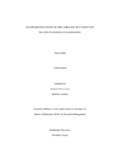
Please use this identifier to cite or link to this item:
https://hdl.handle.net/20.500.14301/550| Title: | An explorative study of the labelling of students by teachers in schools in Kathmandu |
| Authors: | Dahal, Pritha |
| Citation: | Dahal, P.(2016).An explorative study of the labelling of students by teachers in schools in Kathmandu. |
| Issue Date: | Jul-2016 |
| Publisher: | Kathmandu University School of Education |
| School: | SOED |
| Department: | DOEL |
| Level: | Masters |
| Program: | M.Ed. in Leadership and Management (Two Year Program) |
| Abstract: | This is a study with an explorative research design that studied the impact of labels attached by teachers onto students. The study aimed to explore the impact labelling had on students. The study was conducted in three schools in Kathmandu with different student population (ethnicity, class and gender). The study used class observation and in depth interviews with students (18) and six teachers. The study found that labels were based on three broad categories, gender based labels which were attached to students on the basis of how closely they abided by the society’s prescribed gender roles. The students who questioned these gender based norms were labelled negatively. The second label was based on the behavior of the students (how disciplined they were). Those of them who behaved according to the standards set by schools were labelled positively. However, students who were found defying school rules were punished severely. The third label was based on the perceived intelligence of the students. This was not necessarily only based on ability but rather was also influenced by family background. The students were well aware of all the labels attached to them. They were most affected by the negative labels attached to them in regard to their behavior and the punishment they had to receive because of these labels. Girls seemed to be more affected by the gender based labels as they felt that they had to prove their worth to teachers every time because of their gender. Finally the perceived intelligence label seemed to affect students at a minimal level. The students had devised a coping strategy to deal with the labels (they had established an invisible support group in the form of friendships). |
| URI: | https://hdl.handle.net/20.500.14301/550 |
| Appears in Collections: | Disertation |
Files in This Item:
| File | Description | Size | Format | |
|---|---|---|---|---|
| Pritha finished draft printable version.pdf | 1.02 MB | Adobe PDF |  View/Open |
Items in DSpace are protected by copyright, with all rights reserved, unless otherwise indicated.